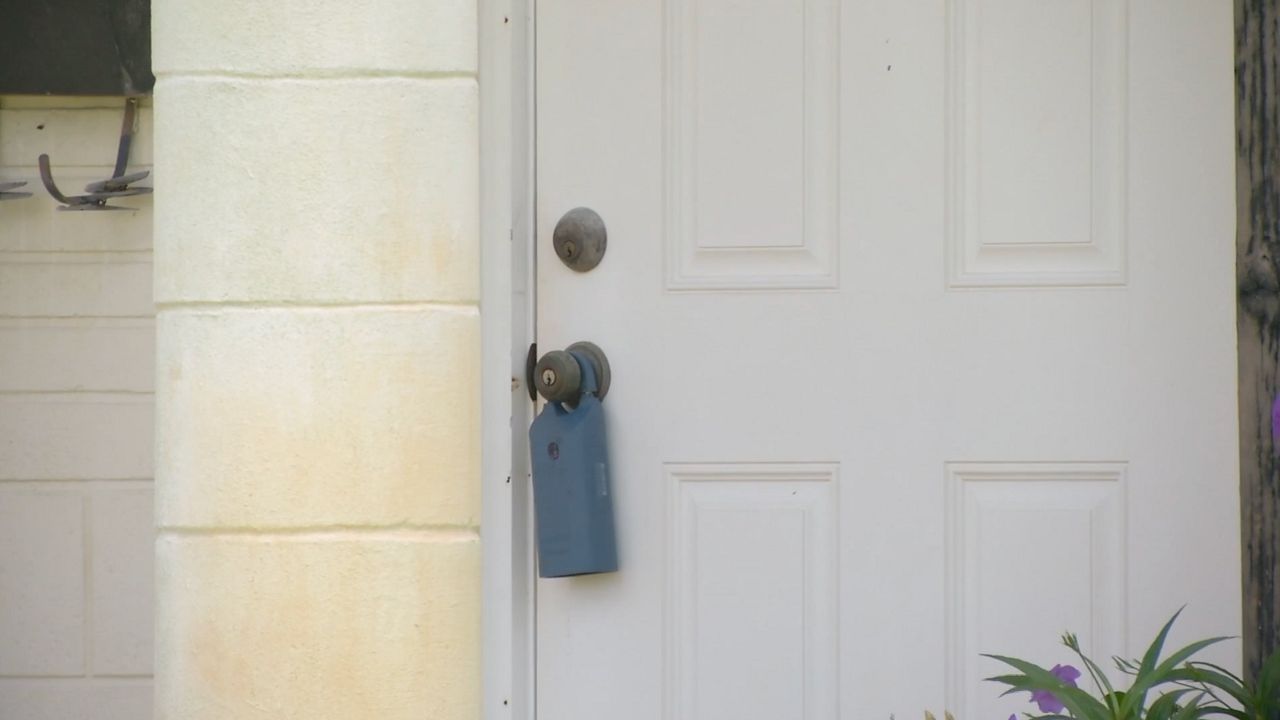LOUISVILLE, Ky. — More than 75,000 Kentuckians could be put out of their homes in January when the Centers for Disease Control and Prevention’s (CDC) moratorium on evictions expires.
The estimate comes from an analysis of U.S. Census data from the consulting firm Stout Risius Ross, which also says that by next month, Kentuckians will have accumulated a staggering rent shortfall standing somewhere between $149 million and $266 million.
Without new action to prevent mass evictions, the new year will bring “a lot of people out on the streets,” said Clare Wallace, Executive Director at South Louisville Community Ministries. “It’s really, really scary.”
Wallace, who created the website StopMyEviction.org, has worked with clients throughout the pandemic to navigate the byzantine eviction process. Many of her clients are out of work due to the pandemic, including the 88-year-old man who worked at Churchill Downs before COVID-19 ground the country to a halt.
He’s due in eviction court this week, Wallace said, and thanks to a housing crisis that was in full effect before the pandemic, she’s having trouble finding him a place to go.
“He’s paying $800 a month and we can’t can’t find him a new apartment he can move into immediately, especially with an eviction on his record and his limited income,” she said. “This is an 88-year-man who’s trying to work and now he’s looking at homelessness."
The end of CDC’s eviction moratorium, which also spells the end of Kentucky's program, couldn’t come at a worse time. Nine months into the pandemic, the U.S. is seeing record numbers of COVID-19 cases and deaths.
In response, businesses are closing, jobs are being eliminated, and economic instability is increasing, just as a host of pandemic relief measures, from unemployment benefits to utility assistance, are set to expire. In just four weeks time, people could be without the protections against eviction that have kept thousands of Kentuckians housed this year.
The CDC’s moratorium is part of a patchwork of programs from the city, state, and federal government meant to help people avoid eviction and the financial hardship that comes with it. In March, Gov. Andy Beshear issued an executive order suspending all evictions in Kentucky. The CARES Act, passed by Congress in March, also included protections for some renters facing evictions.
At the start of July, Louisville Metro Government opened applications for its eviction prevention programs, which were funded with more than $21 million in federal CARES Act money. Over the course of the next four months, the programs benefited more than 6,700 residents living in 2,950 units.
As the pandemic dragged on, more programs emerged. In early September, a state-run $15 million eviction relief fund began accepting applications. The program allowed renters who were behind on rent or facing a pending eviction to apply for a lump sum payment that would go to their landlord, who had to agree to waive late fees, penalties, and up to 10% of late rent. Applications to the program ended on November 5.
At around the same time, the CDC announced its moratorium on evictions, an effort to prevent the spread of COVID-19 likely to result from people moving into shelters or crashing with family members. Despite all of this, evictions have not ground to a complete halt during the pandemic.
“It’s not a catchall,” Wallace said of the CDC's ban. “There are a lot of ways that someone can still be evicted.” The order includes several loopholes that allow landlords to put out tenets, gives significant discretion to judges, and, crucially, requires renters to opt in.
“It’s a document you have to find and print out,” Wallace said. “You have to know it exists. The eviction courts are still full everyday of people who are just finding out about the CDC declaration.”
Adrienne Bush, the executive director of the Homeless and Housing Coalition of Kentucky, said another federal relief bill is essential to avoiding the coming catastrophe.
“We need Senate Majority Leader Mitch McConnell to prioritize real assistance to his constituents, and that includes robust rent relief, an extension and expansion of the CDC’s national eviction moratorium, and continue homeless assistance through the winter months,” she said.
Without further action, it’s clear that people experiencing housing insecurity will be in danger. The CDC acknowledged this in its original moratorium, which said the program would help sick people isolate, healthy people stay home more often, and prevent people from having to live in unsafe, congregate settings.
New research out this week added evidence to the claim. The study, which covered the six months between March and September, found that when states lifted their moratoriums on evictions, COVID-19 cases increased. All told, researchers found that ending eviction protections during the pandemic resulted in up to 433,700 more cases and 10,700 additional COVID-related deaths.
Bush and Wallace emphasized that, as much as federal aid is needed, there is also a role for the state government to play. Bush would like to see the state's depleted $15 million eviction relief fund replenished. Wallace says Beshear and mayors around the state must take action.
“I cannot imagine there being a substantial enough relief package that comes early enough to cover this issue,” Wallace said. “In the meantime, it’s absolutely critical that we have a local or state moratorium on set-outs. It is a matter of public health.”



